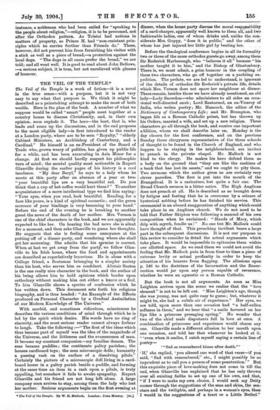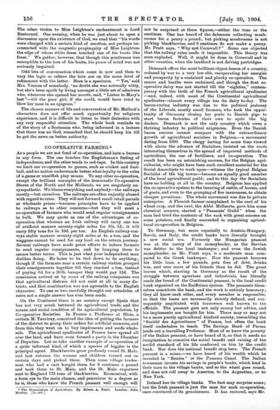THE VEIL OF THE TEMPLE.*
The Veil of the Temple is a work of fiction—it is a novel in the true sense—with a purpose, but it is not very easy to say what that purpose is. We think it might be described as a painstaking attempt to make the most of both worlds. Here is the plan of the book. A number of what we suppose would be called " smart " people meet together at a country house to discuss Christianity, and, in their own opinion, soon explode it. The hero—the host, that is, who leads and sums up the discussions, and in the end proposes to the most eligible lady—is first introduced to the reader at a London party, where are to be seen "Royalty," " elderly Cabinet Ministers, an Archbishop of Canterbury, and a Cardinal." He himself is an ex-President of the Board of Trade who, grown weary of politics, has given up public life for a while, and has been excavating in Asia Minor for a change. At first we should hardly suspect his philosophic turn of mind; the mental quality most noticeable in Rupert Glanville during the earlier pages of his history is a cool insolence. " My dear Beryl," he says to a lady whom he meets at this party after an absence of a year or two, " your beautiful lips are a very beautiful red. Do you think that a cup of hot coffee would hurt them P " To another acquaintance of a more intellectual type we find him saying: " Your eyes, when you read, look beautiful Reading, for a face like yours, is a kind of spiritual cosmetic; and the green morocco of your bindings is very becoming to your band." Before the end of the evening he is breaking to another guest the news of the death of her mother. Mrs. Vernon is one of the chief characters in the book, and we are apparently expected to like her. On hearing the bad news she is silent for a moment, and then asks Glanville to guess her thoughts. He suggests that she is feeling some annoyance at the putting off of a dinner party, and wondering where she shall get her mourning. She admits that his wrmise is correct. When at last we get away from the partl, we follow Glan- ville to his Irish home, where the food and appointments are described as superlatively luxurious. He is alone with a College friend, a Scotsman belonging to a simpler society than his host, who serves him as confidant. Alistair Seaton is the one really nice character in the book, and the author of his being allows him to hold opinions which border upon orthodoxy without making him out either a knave or a fool. To him Glanville shows a species of confession which he has written down. This document sets forth his religious biography, and is thus headed : "An Example of the Effects produced on Personal Character by a Gradual Assimilation of our Modern Knowledge of The Universe." ,
With morbid, and sometimes ridiculous, minuteness he describes the various conditions of mind through which he is led by the spirit which denies. His words have no ring of sincerity, and the most serious reader cannot always forbear to laugh. Take the following :—" The first of the ideas which thus became part of myself was the idea of the magnitude of the Universe, and the littleness and the evanescence of man. It became my constant companion—my familiar demon. The seas became puddles ; the continents paltry parishes; the houses cardboard toys ; the men microscopic dolls ; humanity a passing rash on the surface of a dissolving pilule." Certainly the picture of a microscopic doll living in a card- board house in a paltry parish beside a puddle, and forming at the same time an item in a rash upon a pilule, is truly appalling, but somehow it fails to awake sympathy. Rupert Glanville and his friend are not long left alone. A large company soon arrives to stay, among them the lady who lost her mother.' Serious arguments begin on the first evening at
• The Val of the Temple. By W. H. Mallook. London: John Murray. [69.] dinner, when the house party discuss the moral respraibilk of a card-sharper, apparently well known to them all, and two fashionable ladies, one of whom drinks and, unlike the con- siderate Mrs. Guppy, "does it in public," and the other of whom has just injured her little girl by beating her.
Before the theological conference begins in all its formality two or three of the more orthodox guests go away, among them Sir Roderick Harborough, who " believes it all " because " hie mother taught it to him," and the Bishop of Glastonbury. There is, we must admit, a grim humour in the coupling of these two characters, who go off together on a yachting ex- pedition. The prelate, we are led to understand, is ignorant of the details of orthodox Sir Roderick's private life, details which Mrs. Vernon does not spare her neighbour at dinner. There remain, besides those we have already mentioned, an old lady—Lady Snowdon—who administers to all sides an occa- sional well-directed snub ; Lord Restormel, an ex-Viceroy of India, who writes poetry ; Mr. Hancock, the editor of the Dictionary of Contemporary Life; and Mr. Brompton, who began life as a Roman Catholic priest, but has thrown up his Orders, married a wife, and set up a new religion. These characters go all through the book, and receive one important a idition, whom we shall describe later on, Monday is the day chosen for the first conference, and on the previous Sunday three clergymen representative of the three schools of thought to be found in the Church of England, and who happen to be staying in the neighbourhood, are invited to ' preach in the private chapel. Mr. Mallock is • not kind to the clergy. He makes his hero defend them as a body on the ground that "they are like the cashiers of a bank that has lost its assets," and we ought to pity them. Two sermons which the author gives us are certainly very clever parodies. The first is put into the month of the Evangelical. It is a caricature, but quite a fair one. The Broad Church sermon is a bitter satire. The High Anglican does not preach at all. He is described as so brought down by fatigue and fasting that he is overcome by a seizure of hysterical sobbing before he has finished his service. This ceremonial is an absurd exaggeration of anything which oould take place in an Anglican church. We do not need to be told that Father Skipton was following a manual of his own composition when he exclaimed : " Hands of Mary, which drip with myrrh, fondle us !" No one but Mr. Mallock could have thought of that. This preaching incident bears a large part in the subsequent discussions. It is not our purpose in this review to consider in detail the actual arguments which take place. It would be impossible to epitomise them within our allotted space. As we read them we could not avoid the feeling that Mr. Mallock puts in from time to time a piece of extreme levity or actual profanity in order to keep the attention of his hearers from flagging. The allusions upon p. 146 to the doctrines of the Incarnation and the Resur- rection would jar upon any person capable of reverence, whether he were an agnostic or a Roman Catholic.
But the book is not all arguments. As soon as Miss Leighton arrives upon the scene we realise that the " love element" is not to be left out. " Miss Leighton's age, though she was young, was not quite easy to guess ; but, whatever it might be, she had a subtle air of experience." Her eyes, we are told, upon more than one occasion had "a half-sullen softness in them," and we hear that " a smile hovered on her lips like a primrose presaging spring." No wonder that two of the chief male disputants fell in love at once. A combination of primroses and experience would charm any one. Glanville made a different allusion to her mouth upon one occasion, and told her that whenever he looked at it, "`even when it smiles, I catch myself saying a certain line of
Poetry—
"'Sad as remembered kisses after death."'
If,' she replied, you altered one word of that verse—if you said, " Sad with remembered," etc., I might possibly be so imprudent as to call you a person of some penetration.' " But this exquisite piece of love-making does not come in till the end, when Glanville has explained that he has only thrown over all existing faiths to set up one of his own, and that, " if I were to make my own choice, I would seek my Deity sooner through the suggestions of the seas and skies, the sea- stars and the twilights, and perhaps in a woman's eyes, than I would in the suggestions of a tract or a Little Bethel"
The other victim to Miss Leighton's enchantment is Lord Restormel. One evening, when he was just about to open a discussion upon the existence of God, we read that "his words were charged with a certain kind of emotion, not perhaps un- connected with the magnetic propinquity of Miss Leighton, the edge of whose white dress touched one of his boots like foam." We gather, however, that though this gentleman was susceptible to the toes of his boots, his peace of mind was not seriously impaired.
Odd bits of conversation which come in now and then to vary the logic or relieve the love are on the same level of refinement with the latter. Here is a specimen. " Yes,' said Mrs. Vernon of somebody, `no doubt she was naturally witty, but she's been spoilt by living amongst a little set of admirers who, whenever she opened her mouth, said, " Listen to Mary's last "—till the poor girl, if she could, would have tried to blow her nose in an epigram."
The chosen manner of life and conversation of Mr. Mallock's characters does not offer much opportunity for religious experience, and it is difficult to listen to their dialectics with any very respectful attention. The whole book reminds us of the story of a Scotsman who, being informed in a lecture tbat there was no God, remarked that he should keep his till he got the news on better authority.







































 Previous page
Previous page